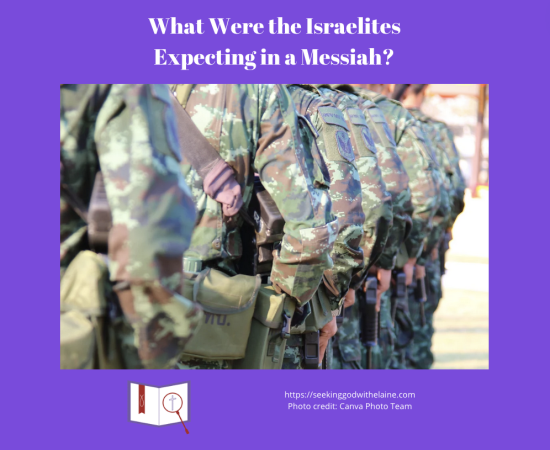We are told that the Israelites were looking for a military Messiah to free them from Roman rule. But what else were they looking for in a Messiah? This daily devotional looks at the expectations the Israelite people had for the coming Messiah.
Nuggets
- It had to be a given that the Messiah would be Jewish.
- The Messiah would have to be a charismatic leader to get the whole nation of Israel to follow Him.
- This utopia created by the Messiah would be for more than just the Jewish people; it would be for the world.
- What the Israelites really got wrong was just thinking the Messiah would be an ordinary man.

Israel was used to the person sent from God being a military leader. We don’t really think of Moses as a military leader, but He led battles. We know Joshua was a great military leader.
The judges were also more military, even though they did settle squabbles. But the judges didn’t do a good job of protecting the people.
That is why the people asked for the kings — Saul and David especially. If judges couldn’t protect them, surely a king would (Jer. 23: 5).
That is the bottom line — the Israelites wanted to be protected. They didn’t want to be ruled by Rome — or anyone else.
The Israelites thought the Messiah would be a military leader. Jesus just didn’t fit their bill, so they thought there was no way He could be the promised Messiah. He seemed too peaceful.
I hadn’t really studied how the Israelites perceived the Messiah would be. It ends up that their expectations created a long list.
The Messiah, the Citizen
"My servant David shall be king over them, and they shall all have one shepherd. They shall walk in my rules and be careful to obey my statutes. They shall dwell in the land that I gave to my servant Jacob, where your fathers lived. They and their children and their children's children shall dwell there forever, and David my servant shall be their prince forever. I will make a covenant of peace with them. It shall be an everlasting covenant with them. And I will set them in their land and multiply them, and will set my sanctuary in their midst forevermore. My dwelling place shall be with them, and I will be their God, and they shall be my people. Then the nations will know that I am the Lord who sanctifies Israel, when my sanctuary is in their midst forevermore" (Ezek. 37: 24-28 ESV)
It had to be a given that the Messiah would be Jewish.
Not only would the Jewish people not accept anything less, but they were also told not to be ruled by anyone who was not Jewish (Deut. 17: 15). Since the Messiah would be a judge (Isa. 11: 2-5), it is safe to assume the Israelites expected Him to be knowledgeable of Jewish laws and commandments and be proficient in enforcing them.
The Messiah also had specific criteria He would have to fulfill. He couldn’t come from just any tribe; He must be a descendant of Judah (Gen. 49: 10), David (II Sam. 7: 12-16), and Solomon (I Chron. 22: 10). Family mattered.
The Messiah, the Jewish Leader
The Messiah would have to be a charismatic leader to get the whole nation of Israel to follow Him.
They would be looking for fair judge (Jer. 33: 15). I think, though, they were looking more for someone to wow them.
But the Israelites were told in Isaiah 11: 11-12; Jeremiah 23: 3, 30: 3; and Hosea 3: 5 that God would regroup the remnant from exile through the Messiah. To them, if they were exiled because of a military takeover, they would have to be restored because of a military defeat.
This military defeat would reclaim their Jewish heritage. Paramount to reestablishing that would be rebuilding the Jewish Temple in Jerusalem (Jer. 33: 17-18). The Messiah would free them to be God’s people again.
The Messiah, the World Leader
This utopia created by the Messiah would be for more than just the Jewish people; it would be for the world.
The Messiah’s government would establish peace in the world (Isa. 2: 4) because the world would serve one God (Isa. 11: 10, 40: 5; Mic. 4: 2-3; Zeph. 3: 9). Since everyone would be worshiping the One true God, the commandments would be followed: no murder, stealing, coveting, etc. Sin would be a thing of the past (Zeph. 3: 13). They would get to celebrate Jubilee again.
And ooo, baby, isn’t that a good thing? The Jubilee happened every 50 years. It was a time of rest, as the land was given a time to rejuvenate. Things went back to their original owners. If an Israelite person had to sell something, like the house, it could be reclaimed in Jubilee. Those Israelites who had become slaves were set free.
Why did all this happen? It was not only a way to combat slavery, it also addressed poverty. It was a way — established by God, not man — to redistribute the wealth. (Sound familiar? I bet the haves nots liked Jubilee; haves, not so much.) Too bad there were no specific instructions given as to how to accomplish that God’s way.
The Messiah, the Man
What the Israelites really got wrong was just thinking the Messiah would be an ordinary man.
But, in their defense, weren’t the prophets just ordinary men? Weren’t their kings just ordinary men?
Micah 5: 2 says, “But you, O Bethlehem Ephrathah, who are too little to be among the clans of Judah, from you shall come forth for me one who is to be ruler in Israel, whose coming forth is from of old, from ancient days” (ESV emphasis added). Ancient of Days is one of the titles given to God.
Isaiah 9: 6 says, “For to us a child is born, to us a son is given, and the government will be on his shoulders. And he will be called Wonderful Counselor, Mighty God, Everlasting Father, Prince of Peace” (NIV emphasis added). This is another instance of the use of names — a practice very important to the Israelites.
Nope, I don’t understand how Jesus can be both. I don’t understand how you can have more than 100%. To me, Jesus would be 200% because He is 100% God and 100% man.
We like to say we give something 110%. Apply it this way, and it would mean Jesus is really invested into whatever He was doing.

Making the Connections
The Israelites had a lot of prerequisites for the job, didn’t they? They knew what they wanted, and they knew what they needed. Jesus just didn’t fit their bill.
But Jesus was exactly the Messiah God was looking for. Look back over the list — judge, leader, worshipper, peacemaker, God. Jesus is all of those.
Let’s think about it for a minute. Isaiah 55: 8-9 says, “‘For my thoughts are not your thoughts, neither are your ways my ways,’ declares the Lord. ‘As the heavens are higher than the earth, so are my ways higher than your ways and my thoughts than your thoughts’” (NIV). We may think we know what God should do, but our way isn’t necessarily best or His way.
Israel didn’t need a king — they needed a King. They didn’t need a political leader — they needed a Savior. Don’t we?
God knew what they wanted and thought they needed — but gave them something so much better. They were focused on here and now — God focused on eternity.
How Do We Apply This?
Jesus met all of the qualifications to be Messiah. Some may need a military leader (which He will be in the second coming) because that is what their background is. Adam is my little rule person. I know he would be the tattletale in school to say, “Teacher, Elaine stole Tommy’s pencil.” He would identify with the judge. Jesus fits everyone’s needs.
Jesus is exactly Who we need — even if we don’t know it. Jesus not only is 200%, but He also gave 200% for us. He gave everything — even His life — to reconcile us to God. He is Who you and I need, also.
Regardless of our circumstances, we need to live as God’s people. Whether we are Herberts on our hamster wheels, have had to give up things that were very important to us, or feel enslaved to something, Jesus is our Jubilee. It might not be in this lifetime. It will be for eternity.
The Israelites had expectations of a Messiah that mostly centered around giving them what they needed. God gave them what He — and they — and we — need.

Gracious Heavenly Father. You know us so well. You know exactly what we need. You provide for those needs in ways that are perfect. Help us to accept Your perfect Will, even when we have trouble to understand it. Thank You for providing the Messiah to reconcile us to You. Amen.
What do you think?
Leave me a comment below (about this or anything else) or head over to my Facebook group for some interactive discussion.
If you don’t understand something and would like further clarification, please contact me.
If you have not signed up for the email daily or weekly providing the link to the devotions and the newsletter, do so below.
If God has used this devotion to speak with you, consider sharing it on social media.
Pingback: What is the Mystery of Christ? – Seeking God with Elaine
Pingback: Herald Was A Little Off Kilter – Seeking God with Elaine
Pingback: The Faithful Watchers: Simeon – Seeking God with Elaine
Pingback: What Is Religious Freedom? – Seeking God with Elaine
Pingback: Who Is the Greatest in the Kingdom of Heaven? – Seeking God with Elaine
Hi Elaine, I’ve been reading Matthew since the beginning of the the year for my morning devotions. It’s taken so long because I keep needing to search for answers to various questions along the way. Today was no exception while reading Matthew chapter 22. Yes, I’m finally in Passion Week!
I was so interested in finding out the prevailing opinion as to why the Israelites, and the Jewish leaders for that matter, didn’t recognize their Messiah. I’m mean, beside the obvious reasons of jealousy and greed.
Your answers here in this blog post, helped me immensely. You started with the Old Testament view of the Messiah, and compared it to Israel’s expectations. I was stunned to find out that they expected their Messiah to be an ordinary man who was charismatic enough to bring the nation together, mighty enough to defeat Rome and free the people, and powerful enough to create a world government that would resemble the Utopia they longed for.
I know you gave them grace by saying that even the judges and prophets were mere men themselves, but that sure is a tall order for a Messiah. And a thought struck me while reading your words…didn’t Israel have the experience of being lead by God in the desert? That certainly wasn’t done by a man. A man was used, yes. But, weren’t they directed by a cloud by day, and a pillar of fire by night?
Thanks again for this blog post!
Nina
Hi, Nina. Thank you so much for your kind words. I am so glad God used this post as a conduit to talk with You.
I struggled with this, too, for years. Why didn’t they recognize Him? They were supposed to be the religious leaders. If they didn’t get it, who would?
Yes, the Wilderness Wanderers were led by God Himself, but not in human form like the Messiah was. That was in a pillar and a cloud. They didn’t see God as “one of them.”
I don’t seem them expecting God Himself to come down here. He did in the form of Jesus.
I can’t wait to get to Heaven to have God answer all of our questions. But then, we probably will be so awed to be in His presence, it won’t matter any more.
Keep seeking God.
Elaine
Vivid 1700dailey deaths
Is military messiah the reason drs choose not to prescribe making peace with God!??
Good blog. Thought provoking and helpful for advent prayers that I’m writing for our church’s Facebook page. Thank you, Elaine.
Innes. Thank you for your kind words. Those are my goals: to get you thinking and get you applying to your life. Have a joyous advent season. Elaine